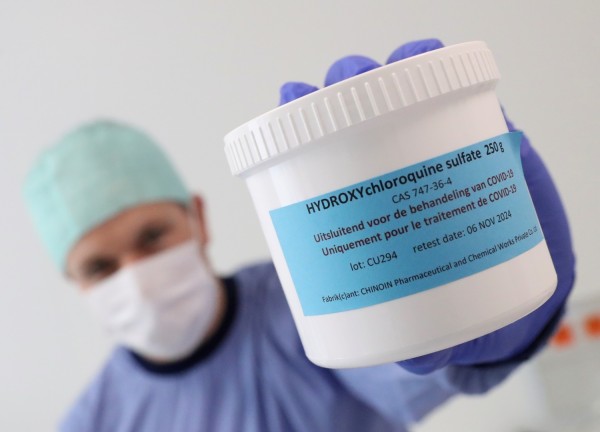Hydroxychloroquine, With or Without Azithromycin, Not Contributing to COVID-19 Treatment, Study Finds

A pharmacist displays a box of Hydroxychloroquine at the CHR Centre Hospitalier Regional de la Citadelle Hospital amid COVID-19 in Liege.
Evidence has emerged to highlight that antimalarial medicine hydroxychloroquine does not help COVID-19 patients in the recovery process.
A recently published study found that hydroxychloroquine, administered either alone or with azithromycin--an antibiotic drug--did not help the conditions of mild to moderate COVID-19 patients.
The research, led by scientists in Brazil, studied 505 COVID-19 patients who either did not need oxygen or are getting up to four liters a minute of oxygen. The research was conducted in more than 50 Brazil-based hospitals.
These more than 500 patients were assigned randomly to get a standard of care. For seven consecutive days, medication was dosed twice a day at 400mg of hydroxychloroquine, and once a day at 500mg of azithromycin.
CHECK THIS OUT: Remdesivir Priced from $2,340 to $3,120 per Patient, Way Cheaper Than Estimated, Gilead CEO Says
What Happened to the Patients After 15 Days?
Following the administration of hydroxychloroquine, researchers examined how the 505 COVID-19 patients were doing after 15 days.
As a result, neither hydroxychloroquine alone nor the said drug plus azithromycin seemed to improve the condition of the patients effectively.
Additionally, irregular heart rhythms and excessively high levels of the liver enzyme were more frequently observed in patients who received hydroxychloroquine doses with or without azithromycin, the research stated.
READ MORE: Potential COVID-19 Vaccine from University of Oxford Could Activate One's Immune Response
Hydroxychloroquine and Its Unproven Effectiveness in the Treatment of COVID-19
As a conclusion, the authors said that among the patients confined at the hospitals with mild-to-moderate COVID-19, the use of this malarial medicine, either alone or with the said antibiotic, did not help in the improvement of clinical status, compared to the existing standard of care.
The research was financially backed by the Coalition COVID-19 Brazil and EMS Pharma, a Brazil-based pharmaceutical firm.
DON'T MISS THIS: Scientists Do Not Expect COVID-19 Vaccine to Be as Effective as Measles Shot
FDA Retracts Authorization for Emergency Use of the Drug
The US Food and Drug Administration announced that it retracted its authorization for emergency use of the said drug, as well as chloroquine. The agency noted that the medicines are unlikely to be efficient when it comes to treating the virus as based on the most recent scientific evidence.
Last month, the National Institutes of Health was halting its clinical test of hydroxychloroquine for patients of COVID-19.
A different study, which came out this month, was conducted by scientists at Henry Ford Health System in Southeast Michigan. They found that the antimalarial medicine increased the chances of survival of patients.
Nevertheless, scientists not part of the said that they were critical of the said finding. They claimed that such a result was not of a similar quality of the formerly-conducted research that showed hydroxychloroquine did not contribute to the effective treatment of COVID-19.
IN CASE YOU MISSED IT: US Buys Majority of Redemsivir Global Stock in Hopes of Ensuring COVID-19 Recoveries
Jul 24, 2020 08:00 AM EDT





